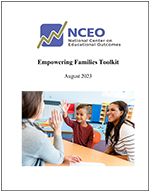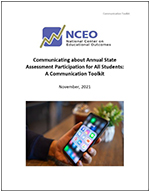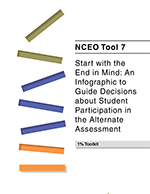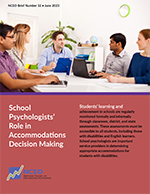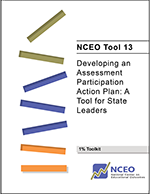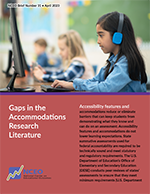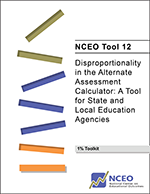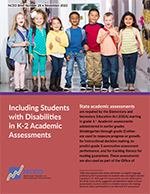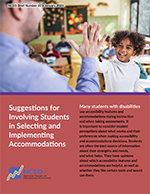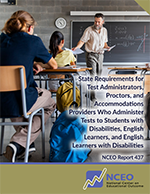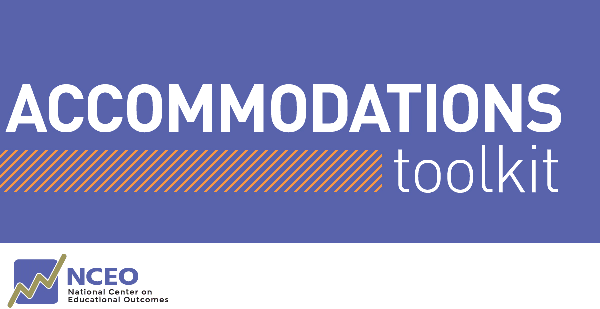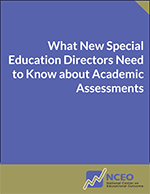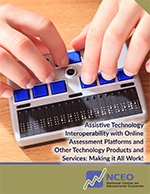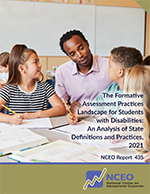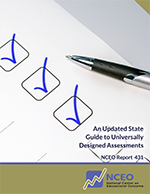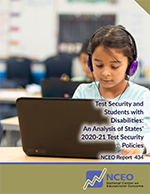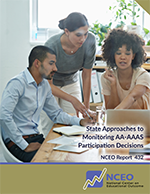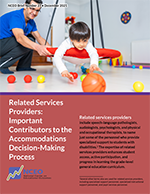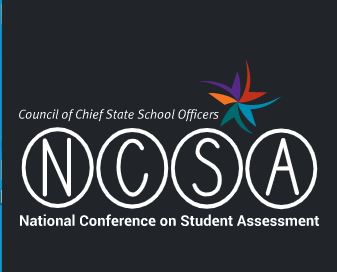Welcome
Effective communication is a cornerstone for fostering collaboration, understanding, and ultimately, student success. Recognizing the importance of communication, we are featuring in this newsletter some of NCEO’s resources for parents and families. The first article is about NCEO’s new Empowering Parents Toolkit which includes videos, one-page flyers, and example social media posts on assessments and assessment-related state systemic improvement plans (SSIPs). Be sure to check out my personal favorite in this series: the video on why assessments are important, and why children with disabilities should participate in them. It is available in English and Spanish.
The next article is about several powerful fact sheets that state education agencies, districts, and schools can use to engage parents and families and enhance their understanding of state assessments. In this issue, there is also an article about several resources for parents and families in NCEO’s Participation Communications Toolkit, including 1-page—as well as customizable—flyers for parents and students.
Additionally, in case you missed them, this issue includes information about several “oldies but goodies” for parents and families.
This issue also includes an article about several other recently published NCEO resources. These resources include a Brief on the school psychologist’s role in accommodations decision making, a report on the relationship between student placement and alternate assessment participation rates, and a report sharing the findings of an analysis of states’ 2021-22 participation guidelines and definitions for alternate assessments based on alternate academic achievement standards (AA-AAAS).
NCEO is active on social media! Follow us to receive regular updates on our activities.
- Facebook: www.facebook.com/NationalCenteronEducationalOutcomes
- X (Twitter): https://twitter.com/NCEOinfo
- LinkedIn: www.linkedin.com/company/national-center-on-educational-outcomes-nceo
- TikTok: www.tiktok.com/@nceoinfo
- Instagram: https://www.instagram.com/nceo.info/
- Threads: www.threads.net/@nceo.info
- YouTube: https://www.youtube.com/channel/UCnvPMaguIvwYqWrBSgZKlUA
Sheryl Lazarus, NCEO Director
Engaging and Enabling Parents: Empowering Parents Toolkit
The National Center on Educational Outcomes (NCEO) recently published the Empowering Families Toolkit. The purpose of the toolkit is to provide accessible materials for parents about topics related to assessments, and assessment-related State Systemic Improvement Plans (SSIPs) and State-Identified Measurable Results (SIMRs) that states commit to reaching. These materials are designed to help support parent participation in stakeholder meetings.
Building Trust Through Two-Way Communication: Assessment Fact Sheets for Parents
The National Center on Educational Outcomes (NCEO) recently published four parent fact sheets with information about student participation in state tests. These engaging Fact Sheets provide easily accessible basic information about state tests, as well as instruction.
Unlocking the Power of Communication: NCEO’s Participation Communication Toolkit
State test participation has benefits for students, their families, and their schools. The National Center on Educational Outcomes (NCEO) recently updated its Participation Communications Toolkit. It is intended to provide a neutral but useful mechanism to guide positive, thoughtful conversations about student testing participation.
Oldies But Goodies: NCEO Parent Resources You May Have Missed
One of the National Center on Educational Outcomes (NCEO’s) all-time most popular resources for parents is an infographic about the implications of assessment participation decisions. Start with the End in Mind: An Infographic to Guide Decisions about Student Participation in the Alternate Assessment provides guidance about IEP team decision making for a student’s participation in the state’s alternate assessment aligned with alternate academic achievement standards (AA-AAAS).
Other Recently Published NCEO Resources
In addition to the parent resources highlighted in this newsletter, NCEO recently published several other new products, including School Psychologists’ Role in Accommodations Decision Making (NCEO Brief #32), The Relationship between Student Placement and AA-AAAS Participation Rates (NCEO Report #439), and 2021-22 Participation Guidelines and Definitions for Alternate Assessments Based on Alternate Academic Achievement Standards (NCEO Report #440).
The Center is supported through a Cooperative Agreement (#H326G210002) with the Research to Practice Division, Office of Special Education Programs, U.S. Department of Education. The Center is affiliated with the Institute on Community Integration at the College of Education and Human Development, University of Minnesota. Consistent with EDGAR §75.62, the contents of this report were developed under the Cooperative Agreement from the U.S. Department of Education, but do not necessarily represent the policy or opinions of the U.S. Department of Education or Offices within it. Readers should not assume endorsement by the federal government.
Project Officer: David Egnor

